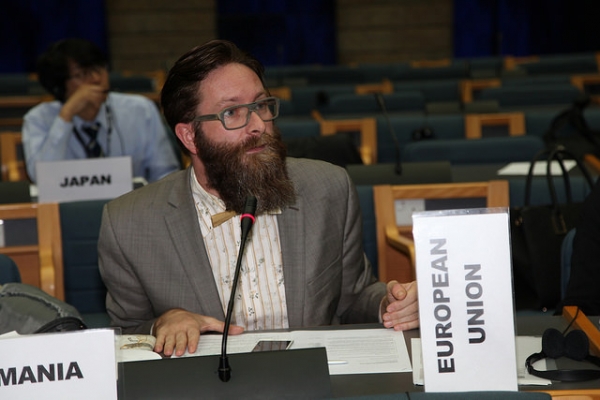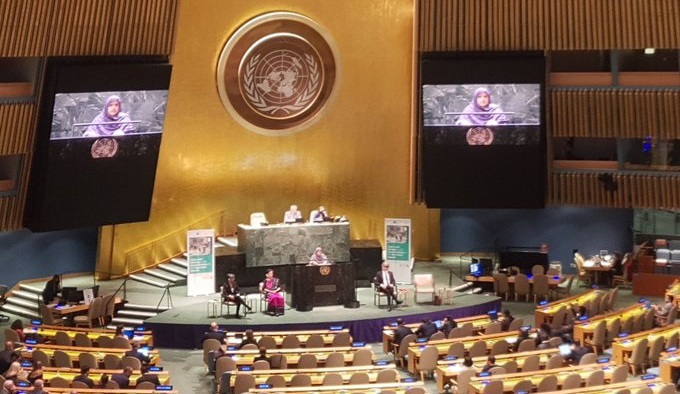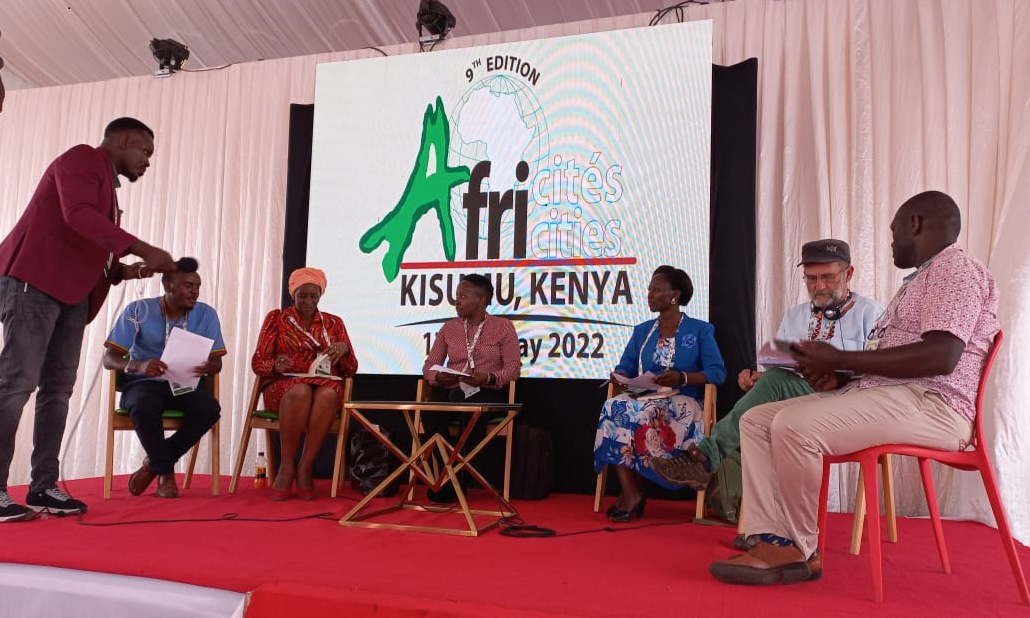
The European Union’s Thibault
Devanlay at PrepCom 2. With the Nairobi talks unable to agree on rules of
procedure for the Habitat III process, the European Union expressed concern
that the PrepCom 2 delegates had “collectively failed”. (UN-Habitat)
NAIROBI— The second of three preparatory meetings for the U. N.’s Habitat III conference wrapped
up late Thursday night, 16 April, on a sour and somewhat contentious note.
Following three days of
negotiations here, the closing plenary ran several hours behind schedule.
Member states had been unable to reach consensus on the rules of procedure that
would govern, among other issues, how and if local authorities and stakeholders
will engage in next year’s signature urban conference.
Typically, only member states
can formally participate in U. N. debates. But the opening of discussions to local governments and
other interested parties, agreed to in the rules for Habitat II in Istanbul in 1996, had
been widely anticipated to take place again this time around.
Instead, a small number of
delegations, in some cases apparently because of political considerations,
resisted. The lack of agreement resulted instead in a request to the U. N. General
Assembly to take up
and decide upon the Habitat III rules of procedure during its next session, in September. (The text
of the stalled provisional rules is available here.)
In its final declaration, the European Union
delegation made forceful remarks about the unresolved matter. “While we are
happy with the very rich general debate in the plenary, that proved the
commitment of all countries and stakeholders for the preparation of the New
Urban Agenda, we cannot hide our frustration that most of the issues under
agenda item 5 of the working group were not agreed upon,” the E. U.’s
Thibault Devanlay said.
Agenda item 5 concerned guidelines for participation
in both the preparatory process and the Habitat III conference itself. The New Urban Agenda is the intended outcome document of
Habitat III.
“We are in particular dismayed
that the discussions on the modalities for improved participation of
stakeholders and local authorities were, once again, postponed to a later
occasion,” Devanlay continued. “On that matter … we collectively failed.”
The E. U. was particularly
concerned about the possibility that putting off the decision on how and
whether local authorities and stakeholders will be able to participate in the
Habitat process could impact on the next and final meeting of the preparatory
committee. “PrepCom 3” is slated to take place in July
2016 in Indonesia.
“We cannot afford to get into
PrepCom 3 without those modalities,” Devanlay said. “It would send a terrible
signal to [local authorities and stakeholders], as it would in particular
impede them to participate effectively in the third PrepCom.”
The European Union’s
frustration was echoed by the United States.
“The longer we wait on this
issue, the more we put at risk the conference,” the U. S.permanent representative
to UN-Habitat, Tobias Glucksman, said. “Stakeholders are key
participants, key voices. For the credibility of the conference and for the
credibility of the outcome document, we must resolve this as quickly
as possible.”
Unprecedented legacy
The draft rules of procedure
were first presented by the Habitat III Bureau, a body made up of member-state representatives from the
major regions, last fall at the first preparatory committee, in New York. The
document was then opened for discussion.
The rules subsequently moved on
to PrepCom 2, held here on 14-16 April, where
instead of being adopted they became a more contentious item. The particular
sticking point concerned the participation of local authorities and
stakeholders in the drafting of the New Urban Agenda.
This is quite a central
concern, given the unusually strong position that local authorities were
granted at the last Habitat conference, in Istanbul in 1996.
At that event, local authorities were given a “special status” that allowed
them a level of participation unprecedented at a U. N. conference.
At Habitat II, local authorities were
permitted to observe and intervene in the drafting of the outcome document, for
instance, although they did not have a vote. Other civil society stakeholders
were likewise able to voice their views to member states through an unprecedented
third committee session during the Istanbul negotiations.
These remarkable arrangements
received wide, positive attention. Indeed, in its 2012 session, the U.N. General Assembly even
called for the Habitat III preparatory process to expand upon the levels of participation
afforded to local authorities and civil society that enriched Habitat II.
In Resolution 67/216, the General Assembly
encouraged “effective contributions from and the active participation of all
relevant stakeholders, including local governments … and other Habitat Agenda
partners, at all stages of the preparatory process and at the
conference itself.”
The resolution further
requested the Habitat III secretary-general to “make proposals … on improved participation
of local authorities and other stakeholders in the preparatory process and the
conference itself, building on the positive experience enabled by the rules and
procedures of the Governing Council of UN-Habitat
and the inclusive engagement modalities of Habitat II.”
In the run-up to Habitat II, the rules of procedure
were agreed upon at PrepCom 2. This time around, however, given the failure to
arrive at a common understanding in Nairobi, that process will have to await
the U. N.General Assembly’s next
session, in September. Final decision on this matter could come possibly as
late as November.
The General Assembly’s
September session already has a very busy agenda, however, given the planned
Special Summit on Sustainable Development and the expected adoption of the Sustainable Development Goals. This is no
small bit of business: The SDGs, which will replace the Millennium Development Goals, will
define the international development agenda for the coming decade and
a half.
Further, should the Habitat III rules of procedure not
be taken up by the General Assembly, it is likely that an extraordinary session
of the preparatory committee would have to be called before PrepCom 3, in
Jakarta in July.
Yet thus far, the Habitat III process’s leadership has
appeared unperturbed by the PrepCom 2 outcome.
“We are now at the
one-and-a-half-year mark from the conference, and while we would like to have
the rules of procedure already approved, it is not extremely important because
we have plenty of time,” Joan Clos, the secretary-general of Habitat III and executive director
of UN-Habitat, said after the
Nairobi events ended. “We are very ambitious in these rules so it is better
that consensus is built.”
He added: “We are on a good
ground. And we hope that stakeholder participation will be approved and
improved from Habitat II.”
Accreditation frozen
Already the confusion over the
rules of procedure has frozen the process to expand civil society participation
in the Habitat III process.
Civil society members already
accredited through the U. N.Economic and Social Council (ECOSOC), as well as those that
participated in Habitat II,
will be grandfathered in to the Habitat III process. However, one of PrepCom 2’s agenda items was the
accreditation of 33 new “major groups and other relevant stakeholders”.
These have now been left in limbo.
The status of these 33 groups was approved on
14 April, and they were given the floor to speak. But a point of order was
raised that questioned how the assembly could approve the status of these
groups if the rules of procedure — which establish the process for
accreditation — had not yet been approved.
The outcome was “very
disappointing”, says Michael Cohen, the director of the International Affairs
Program at the New School in New York, one of the 33 institutions whose
accreditation hung in the balance during PrepCom 2.
“Having participated in Habitat
I and Habitat II,
this is a step backwards in accessibility,” Cohen said. “The fact that civil
society could not even be observers in the working group suggests a lack of
transparency in the whole process.”
United Cities and Local Governments
(UCLG), a global network, established a Global Taskforce to work on the
international development agenda ahead of Habitat III. In a statement to PrepCom 2, the taskforce
underscored the opportunity in ensuring broad participation in the Habitat
process, noting that “an organized constituency” stands “ready
to contribute”.
The group also offered specific
recommendations. The statement cited Rules 64
and 65 of the draft rules of procedure, which reaffirm local
authorities’ HabitatII-related
permissions to participate in deliberations and NGOs’ permissions to
participate in public meetings and provide expert input.
“Despite our desire to see
agreements as soon as possible on improved participation of stakeholders and
local governments and their accreditation, we are still hopeful for an
inclusive process,”UCLG and the taskforce said after PrepCom 2.
“The agenda that the organized
local governments want to bring to Habitat III is not related to domestic affairs but rather local solutions as
contributions to global challenges. The New Urban Agenda cannot be defined
without the local managers and elected representatives [being] accountable to
the inhabitants.”
Solidified schedule
There were some concrete
decisions made at PrepCom 2. In particular, the Habitat III process schedule was
firmed up in response to frustration from member states around the late
delivery of draft “issue papers” — the 22 thematic documents put together by
multilateral agencies that will form a key technical backbone to the Habitat III conversations.
Despite their importance, the
draft papers were reportedly made available only immediately before PrepCom 2
began, thus not giving member states enough time to review them.During
the opening plenary, several countries expressed irritation at
this scheduling.
A resolution was passed, however, that
established a 31 May deadline for delivery of the full issue papers. Member
states will now have until the end of June to submit written comments, and a
consultative process involving stakeholders and local authorities will follow
inJuly.
The finalized issue papers will
in turn feed into thematic “policy units”, made up of external experts, tasked
with offering formal recommendations on the details and implementation of the
New Urban Agenda. Under the new agreement, the policy units must publish their
papers by the end of December, with comments from member states and
stakeholders expected in January. Finally, the “zero draft” of the HabitatIIIagenda must now be made
available no later than six months before the conference, so sometime in
April2016.
Other dates, too, have now been nailed down. The conference itself
will take place 17-26 October, in Quito. And PrepCom 3 will take place 25-27
July, in Jakarta.
Meanwhile the robust schedule
of side events, parallel events, caucuses, exhibits and working groups that
took place outside of the formal PrepCom 2 proceedings in Nairobi certainly
suggests significant interest on the part of civil society to engage with the
Habitat III process.
With a full slate of regional
and thematic meetings, national and regional urban forums, Urban Thinkers
Campuses and other activities in the coming 18 months, attention on Habitat III— and interest in the
actions around the rules of procedure — will likely only strengthen.


